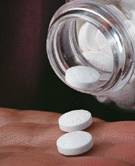- Double Mastectomy May Offer No Survival Benefit to Women With Breast Cancer
- Toxic Lead Found in Cinnamon Product, FDA Says
- Certain Abbott Blood Sugar Monitors May Give Incorrect Readings
- Athletes Can Expect High Ozone, Pollen Counts for Paris Olympics
- Fake Oxycontin Pills Widespread and Potentially Deadly: Report
- Shingles Vaccine Could Lower Dementia Risk
- Your Odds for Accidental Gun Death Rise Greatly in Certain States
- Kids From Poorer Families Less Likely to Survive Cancer
- Tough Workouts Won’t Trigger Cardiac Arrest in Folks With Long QT Syndrome
- At-Home Colon Cancer Test Can Save Lives
Take Aspirin at Bedtime to Better Protect Your Heart, Study Suggests


A daily dose of aspirin has become a common treatment for people at high risk for heart attacks or strokes, because it thins the blood and prevents clots from forming.
But does it matter when during the day you take the drug?
A new Dutch study suggests that people who take aspirin at bedtime might get more protection against heart attacks or strokes.
The research involved nearly 300 heart attack survivors who were taking aspirin to ward off a second heart attack. During two separate three-month periods, half the patients took 100 milligrams of aspirin after they woke up in the morning while the other half took the same dose at bedtime.
The researchers wanted to see if taking aspirin at night could better thin a person’s blood and potentially lower their heart attack risk, said study author Dr. Tobias Bonten, who serves in the department of clinical epidemiology at Leiden University Medical Center in the Netherlands.
“Since the 1980s, it’s been known that cardiovascular events happen more often in the morning,” Bonten said. Morning hours are a peak period of activity for platelets, blood cells that aid in clotting, he said. Doctors suspect that might have a hand in the increased risk of heart attacks and strokes in the morning.
Aspirin reduces the activity of platelets, and thus reduces the chance that those platelets will clot in the bloodstream and cause a heart attack or stroke, according to the findings. The study is scheduled for presentation Tuesday at the American Heart Association’s annual meeting in Dallas.
Research presented at meetings should be viewed as preliminary until published in a peer-reviewed medical journal.
The timing of taking aspirin, however, has not drawn much scholarly attention, said Dr. Gregg Fonarow, a spokesman for the American Heart Association.
“There really have not been studies looking at the timing of aspirin,” said Fonarow, a professor of cardiology at the University of California, Los Angeles. “You would imagine that timing of the dose, morning or evening, wouldn’t matter very much.”
That’s because aspirin has a long-lasting effect on platelets, helping thin the blood for days after it is taken, he said.
“That’s why, prior to surgery, patients are told to hold off on aspirin for five to seven days, and why it continues to thin your blood even when you miss a dose,” Fonarow said.
But the Dutch researchers found that taking aspirin at bedtime reduced platelet activity more than taking it in the morning, apparently because it headed off the body’s normal morning surge in platelet activity.
The team also found that people who took aspirin at bedtime did not suffer any more stomach upset or other side effects than people who took it in the morning, Bonten said.
The researchers also had hoped that taking aspirin at bedtime would lower a person’s blood pressure, something that had been observed in an earlier Spanish study. They found no difference, however, between the blood pressures of waking and bedtime aspirin users.
You don’t necessarily have to start taking your aspirin at night right away, however. Fonarow said the study involved too few people and did not attempt to determine whether taking a bedtime dose will provide better protection against heart attacks or strokes.
“The key question is whether this is enough of a difference that it would translate to improved clinical outcomes,” he said.
Until larger follow-up studies take place, Fonarow said, people prescribed aspirin for heart problems should continue to take it whenever in the day they like.
Another study presented at the American Heart Association meeting found that sedentary seniors can use exercise to slow the progression of heart disease.
Researchers looked at a protein called Troponin T to track the rate of heart injuries in more than 300 people aged 70 and over.
Doctors found that people who had been assigned to a year of supervised physical activity had three times less increase in their Troponin T levels than people who had not regularly exercised.
“Our findings suggest biochemical evidence to support the old adage, ‘You’re never too old to start a physical-activity program to improve cardiac health,'” study author Dr. Christopher DeFilippi, an associate professor of medicine at the University of Maryland School of Medicine, said in a statement.
More information
For more information on aspirin and heart disease, visit the American Heart Association.
Source: HealthDay
Copyright © 2024 HealthDay. All rights reserved.










